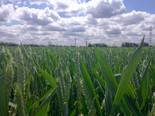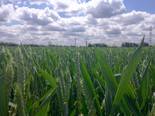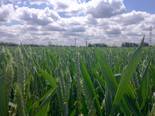Intelligent LED lighting for maximised crop yield and reduced energy use
Research collaboration between University of Essex, Ellume and Cultinova Ltd.
Rationale: Mixed-colour LED lights have the potential to revolutionise horticulture by supplementing natural sunlight to extend growing seasons, increase crop quality and nutritional content and control the time taken for plants to become ready for harvest. Recent advances in LED technology has led to a wide range of LED luminaires becoming available, however, barriers exist to their use due to high capital expenditure, difficulties in matching lighting configuration to growth environment and the complexities of adjusting light intensity and wavelength to the conditions required to evoke desirable crop responses. In this project, two UK SMEs and one University will build, demonstrate and evaluate a state-of-the-art intelligent LED lighting system that continuously measures light spectra in crop canopies and automatically adjusts artificial lighting levels based upon the results to achieve optimised lighting conditions for plants automatically. Fertigation and environmental parameters will be used to complement lighting measurements which together with web-based data sharing and analytics, will realise a powerful tool that will enable growers to leverage the benefits of LED lighting at lower cost and with increased energy efficiency compared to current LED lighting solutions.
Rationale: Mixed-colour LED lights have the potential to revolutionise horticulture by supplementing natural sunlight to extend growing seasons, increase crop quality and nutritional content and control the time taken for plants to become ready for harvest. Recent advances in LED technology has led to a wide range of LED luminaires becoming available, however, barriers exist to their use due to high capital expenditure, difficulties in matching lighting configuration to growth environment and the complexities of adjusting light intensity and wavelength to the conditions required to evoke desirable crop responses. In this project, two UK SMEs and one University will build, demonstrate and evaluate a state-of-the-art intelligent LED lighting system that continuously measures light spectra in crop canopies and automatically adjusts artificial lighting levels based upon the results to achieve optimised lighting conditions for plants automatically. Fertigation and environmental parameters will be used to complement lighting measurements which together with web-based data sharing and analytics, will realise a powerful tool that will enable growers to leverage the benefits of LED lighting at lower cost and with increased energy efficiency compared to current LED lighting solutions.
Meet the team
Essex
Project Lead/ Essex Lead:
Professor Tracy Lawson Professor of Plant Physiologist University of Essex. [email protected] 

Research and Enterprise Office:
Dr Kirstie Cochrane Knowledge exchange Manager University of Essex. [email protected] |
Cultinova Ltd.

E-Llume

|
Summary: The use of LED lights to supplement sunlight is highly effective in extending growing seasons, improving plant morphology and nutritional value and controlling the time to harvest of crops grown in protected environments. Despite this, barriers exist to leveraging the full benefits of LED lighting in horticulture due to high capital expenditure, the complexities of matching light intensity and wavelength to desired crop response, fertigation and atmospheric conditions and the cost and environmental impact of powering LEDs. This project will address this with the development of a system that intelligently controls spectral distributions in crop canopies, enabling the optimisation of lighting configurations and schedules and integration with nutrient delivery and environmental control systems as part of a holistic growth control solution. The system will enable growers to take full advantage of LED lighting to maximise crop yield and quality, benefiting both consumers and the food supply chain. Project SMEs will be able to target significant commercial opportunities presented by an intelligent horticultural lighting system and academic partners will have access to state-of-the-art tools for developing new methods of crop yield improvement. (LED Lighting, Maximising Crop Yield, Reduced Energy Consumption).
|
|
Impact:
There are several immediate impacts associated with this research:
1) A functioning lighting system which can be commercially exploited in the horticultural sector. Such a system will create a market opportunity for flexible LED lighting manufacturers for use in commercial and academic settings with countless future opportunities of presently unforeseeable applications.
2) The system has the potential to extend growing seasons in the UK reducing importation and transportation of glasshouse grown crops with an immediate and obvious impact on CO2 emissions. For example air freight of food accounts for only 1% of food tonnage per km but produces 12% of the food transport CO2 equivalent emissions. LED technologies with commercially beneficial control would aid in sustainable intensification of domestic glasshouse production whilst reducing and mitigating CO2 emissions. It will also permit fresh food production in the UK, expanding UK markets and profits, as well as sustainable food production for the future.
3) The project will provide academics with vital physiological information on the influence of supplementary LED lighting on photosynthesis and how monitoring biological processes can be integrated with commercial applications, paving the way for future collaborations with industry and improving the link between pure scientific knowledge and viable economic applications/output.
Academic Beneficiaries
The planned project combines a number of disciplines, ranging from biological monitoring to software development and engineering to design and develop a flexible and modular commercial LED lighting system. This project extends the use of scientific research protocols and measuring tools for plant health (e.g. chlorophyll fluorescence and thermography) for commercial designed applications, using biological knowledge of which irradiance provides the best environment for plants in order to minimise energy input and the carbon footprint, whilst maximise productivity and yield in a commercial setting. The project demonstrates how coordinating scientific knowledge with commercial needs can greatly advance the application of fundamental biological research.
This research falls within the remit of RCUK and in particular the BBSRC's strategic priorities in crop science to support 'research underpinning the effective and sustainable exploitation of cultivated plants' including 'biotic and abiotic factors that affect crop performance', enhancing crop productivity 'with optimised efficiency of resource use' and 'increased' resilience to environmental stresses and it bares on the strategic priority of 'living with environmental change' and 'technology development for biosciences'. It relates to systems approaches to the biosciences in developing mathematical and computational modelling in a synergistic way to answer biological questions relevant to technological development with a focus of developing tools for improved crop performance and reductions in carbon footprint.
As such the immediate academic beneficiaries of the research are those working in biological sciences and in particular plant physiology and those working in computer science and engineering interested in the development of control and monitoring systems, as well as software developers. The findings of this research and the monitoring of energy use will be interesting from the perspective of climate change and carbon footprint. It will be of interest to computer scientists and those interested in feedback tools for monitoring plants processes. For example, the results from this project could be further exploited by academics interested in the use of fluorescence signals to monitor plant performance under a range of conditions. Additional applications may include feedback controls for watering systems and other wide-ranging commercial uses.
There are several immediate impacts associated with this research:
1) A functioning lighting system which can be commercially exploited in the horticultural sector. Such a system will create a market opportunity for flexible LED lighting manufacturers for use in commercial and academic settings with countless future opportunities of presently unforeseeable applications.
2) The system has the potential to extend growing seasons in the UK reducing importation and transportation of glasshouse grown crops with an immediate and obvious impact on CO2 emissions. For example air freight of food accounts for only 1% of food tonnage per km but produces 12% of the food transport CO2 equivalent emissions. LED technologies with commercially beneficial control would aid in sustainable intensification of domestic glasshouse production whilst reducing and mitigating CO2 emissions. It will also permit fresh food production in the UK, expanding UK markets and profits, as well as sustainable food production for the future.
3) The project will provide academics with vital physiological information on the influence of supplementary LED lighting on photosynthesis and how monitoring biological processes can be integrated with commercial applications, paving the way for future collaborations with industry and improving the link between pure scientific knowledge and viable economic applications/output.
Academic Beneficiaries
The planned project combines a number of disciplines, ranging from biological monitoring to software development and engineering to design and develop a flexible and modular commercial LED lighting system. This project extends the use of scientific research protocols and measuring tools for plant health (e.g. chlorophyll fluorescence and thermography) for commercial designed applications, using biological knowledge of which irradiance provides the best environment for plants in order to minimise energy input and the carbon footprint, whilst maximise productivity and yield in a commercial setting. The project demonstrates how coordinating scientific knowledge with commercial needs can greatly advance the application of fundamental biological research.
This research falls within the remit of RCUK and in particular the BBSRC's strategic priorities in crop science to support 'research underpinning the effective and sustainable exploitation of cultivated plants' including 'biotic and abiotic factors that affect crop performance', enhancing crop productivity 'with optimised efficiency of resource use' and 'increased' resilience to environmental stresses and it bares on the strategic priority of 'living with environmental change' and 'technology development for biosciences'. It relates to systems approaches to the biosciences in developing mathematical and computational modelling in a synergistic way to answer biological questions relevant to technological development with a focus of developing tools for improved crop performance and reductions in carbon footprint.
As such the immediate academic beneficiaries of the research are those working in biological sciences and in particular plant physiology and those working in computer science and engineering interested in the development of control and monitoring systems, as well as software developers. The findings of this research and the monitoring of energy use will be interesting from the perspective of climate change and carbon footprint. It will be of interest to computer scientists and those interested in feedback tools for monitoring plants processes. For example, the results from this project could be further exploited by academics interested in the use of fluorescence signals to monitor plant performance under a range of conditions. Additional applications may include feedback controls for watering systems and other wide-ranging commercial uses.